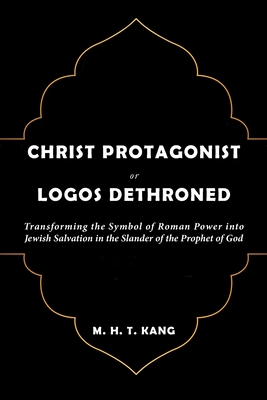Christ Protagonist or Logos Dethroned

Christ Protagonist or Logos Dethroned
This is a book about Western Civilization. It serves as an "introduction to philosophy" even as it takes the discipline in a new direction-one that combines theology, philosophy, and political theory into a single chronological progression.
The central motif in this progression is the figure of Christ: a man cast as a heroic figure within a false dialectic of oriental vs. occidental, and religion vs. science. Paul is cast as creator of the main Western values-"all for one," separation of church and state, faith in the future, progressive revelation, Gentiles coming into the Jewish salvation, salvation by faith alone, grace through suffering-all amidst his characteristic bravado and false humility. This is the application of 'Paulist' themes to the full breadth of the progress of Western civilization, and even more, to the scientific and secular worldview which developed in Europe. This worldview became, over time, a horror show: Paul's preaching in Europe and the Jewish diaspora there caused the formulation of what is now being termed a "Judeo-Christian" synthesis to promote the pseudo-eschatology of the coming kingdom of God.
The book is organized into four semi-independent parts. Part one is a historical critique of first-century Palestine. Part two describes a transition from the historical world of "the experts" to the historical and political narratives of Christian theologists and their co-religionists. Part three examines the subversive role of philosophers in spreading the Pauline synthesis or Christian message, which led to the unification of Europe and therefore the development of the secular and scientific worldview. Finally, Part four looks at Christianity on its own terms, focusing and narrowing in on the doctrines and teachings presented to us in the New Testament; here, one finds a full exegesis of the Pauline epistles.
Vast in scope and ambition, this book addresses all the major themes of the contemporary scientific/religious worldview, deconstructs them, and then casts these ideas in a profoundly new light.
PRP: 155.00 Lei
Acesta este Prețul Recomandat de Producător. Prețul de vânzare al produsului este afișat mai jos.
139.50Lei
139.50Lei
155.00 LeiLivrare in 2-4 saptamani
Descrierea produsului
This is a book about Western Civilization. It serves as an "introduction to philosophy" even as it takes the discipline in a new direction-one that combines theology, philosophy, and political theory into a single chronological progression.
The central motif in this progression is the figure of Christ: a man cast as a heroic figure within a false dialectic of oriental vs. occidental, and religion vs. science. Paul is cast as creator of the main Western values-"all for one," separation of church and state, faith in the future, progressive revelation, Gentiles coming into the Jewish salvation, salvation by faith alone, grace through suffering-all amidst his characteristic bravado and false humility. This is the application of 'Paulist' themes to the full breadth of the progress of Western civilization, and even more, to the scientific and secular worldview which developed in Europe. This worldview became, over time, a horror show: Paul's preaching in Europe and the Jewish diaspora there caused the formulation of what is now being termed a "Judeo-Christian" synthesis to promote the pseudo-eschatology of the coming kingdom of God.
The book is organized into four semi-independent parts. Part one is a historical critique of first-century Palestine. Part two describes a transition from the historical world of "the experts" to the historical and political narratives of Christian theologists and their co-religionists. Part three examines the subversive role of philosophers in spreading the Pauline synthesis or Christian message, which led to the unification of Europe and therefore the development of the secular and scientific worldview. Finally, Part four looks at Christianity on its own terms, focusing and narrowing in on the doctrines and teachings presented to us in the New Testament; here, one finds a full exegesis of the Pauline epistles.
Vast in scope and ambition, this book addresses all the major themes of the contemporary scientific/religious worldview, deconstructs them, and then casts these ideas in a profoundly new light.
Detaliile produsului










